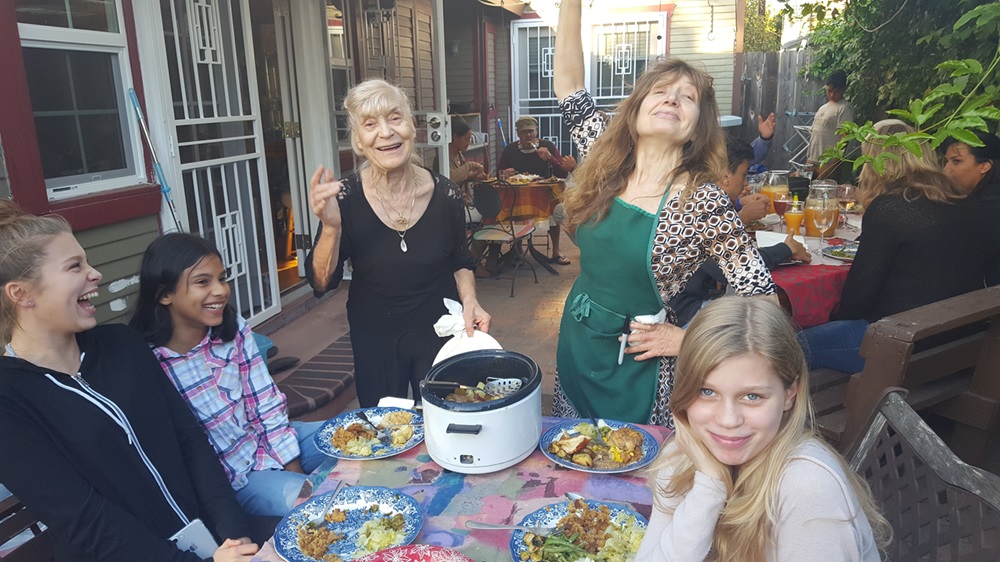Township Tour, Cape Town, South Africa
–
Rand and I have been talking a lot about entitlement lately. It’s something that comes up a lot for both us. I think we’re both incredibly scared of forgetting just how damn lucky we are.
Every now and then, I take a minute think about how charmed my existence is: how every single day is full of beautiful things and people and good health and the occasional cookie or four.
I think that when life gets cushy and nice, it can be easy to lose perspective. To look at all the wonders of your life, all the lucky breaks and acts of charity from others, and suddenly start thinking that you’ve somehow deserved it. That you’ve earned it, and that if people have less than you, it’s because they’ve managed to muck things up for themselves.
But that is complete and utter bullshit. You can sit on your butt and live a cushy life if the circumstances are right. Or you can work your fingers to the bone day in and day out and have absolutely nothing to show for it if the circumstances are wrong. Life can be stupidly unfair, and if we are lucky enough to have the good things outweigh the bad, then we’d better take a minute, or an hour, or several long years, to acknowledge that.
And, hell, if we actually have those several long years in which to do that? That’s once more thing to add to the “good” list.
Rand and I try to do this. We try to keep each other in check. To remind ourselves that we’ve hit the jackpot time and again. How lucky we are that the kid we fell in love with in our 20s has grown into the person we still love – passionately, dearly, often obnoxiously- now that we are in our 30s. That he managed to crawl out of the copious hole of debt he had, and now is the head of a company that’s doing okay. That even the scariest moments of our life turn out to not be brain cancer.
It’s why I don’t play lotto: because it would just seem greedy in the face of all of this.
While we were at the Kloof, I worried about entitlement a lot. I worried that the wonderful things around me would start to seem commonplace. That I’d become impossible to please, and impossible to be around. When we got back to Cape Town, I told Rand that I needed to get some perspective on things. I needed a reality check.
And so we got one, in the form of a township tour.
The townships are a result of apartheid. As the government moved to segregate different races, and establish “white-only” areas of major cities, people were moved to the outskirts of town, into communities now known as townships.
The townships, in adherence with the Group Areas Act (one of the many heinous laws passed under apartheid), were divided by race. Sometimes families would be split up if it was determined (by a governmental panel) that one family member was of a different race than the rest.
Our tour was recommended to us by a South African colleague of Rand’s – he noted that the money that we’d pay would go directly back to the township. We were picked up at our hotel at about 10am by a gentleman named Thandis, who was from one of the townships we were about to visit. He was in possession of a bright smile and deep dimples that we saw only once, and he spoke with a sort of melodic cadence, as though he was reading a poem and playing just a little too much attention to the meter.
I liked him instantly.
The first place Thandis took us to was the District Six Museum, which I mentioned briefly in my post about the history of apartheid. District Six was bustling community in Cape Town, home to 60,000 people of different racial backgrounds. Under the Group Areas Act, the land was declared a “whites-only-area” and the residents were removed from their homes, and pushed to the outskirts of town and into townships. Their homes in District Six were demolished.

–
The museum traces the history of District Six and what it was like for the people who lived there, putting a very personal face on who was impacted by apartheid. The floor of the museum is an enormous map of neighborhood, with handwritten notes dispersed throughout from its former residents.

–
Old street signs can be found everywhere in the museum (it might have been my favorite touch).

–
It also discuss the future of the area: many former residents of District Six (and their descendants) are planning to move back to the area thanks to the Commission of Restitution of Land Rights.
From there, we drove to several of the townships outside Cape Town: Langa and Guguletu.
I didn’t know what to expect – at the time, I had only a dim understanding of how they came about (note to self: maybe next time, write a historical post about an area BEFORE you visit). My first impression of the townships was this scene, which I snapped through the window of our tour van:

–

–
I had no idea what was going on. They don’t really teach you this stuff in grade school – at least, not in the states.
What I later realized was that in the townships, the atrocities of apartheid became distilled. Poverty was rampant. If you weren’t white, you’d be taxed at a higher rate, received a lower wage, and would be limited in the type of jobs you could hold. There was nothing to aspire to, no promise that life would reward you for intelligence or hard work. Under the Bantu Education Act, funding to schools was limited, and a new generation of children were taught that the best they could hope for would be to work a menial job for a white elite.
Given that it is from this dire situation that the townships arose, I suppose it’s a miracle that anything grew out of them. But they did grow – and rapidly. The population of the townships skyrocketed, and some of the largest cities in South Africa are found in these dusty outskirts. More than a million people live in these areas, just outside of Cape Town.
Thandis pulled the van by the side of the road, and ushered us out, to a spot where a young woman was standing in the shade of a small shack. She had a bored expression of her face, paying half attention to an array of sheep heads on a table near the road, and some meat roasting on a grill nearby.

–
Thandis explained that this was a common quick meal in the area – you’d stop at one of the little stands and grab some of the cooked meat (kind of like fast food). The heads were thrown right on the grill, which burned the hair right off, but the brains were discarded after cooking (which surprised me. Italians eat it.)
Later, I’d look down and see the jawbone of a sheep in the dirt at my feet – evidence of a long-ago finished meal.
 –
–
We walked on, and Thandis introduced us to a young man named Luvuyo, who, after seeing how we struggled with his name, insisted we call him Lu.
Lu had a deep voice and a bright smile that belied an inherent shyness. His English was impeccable, and Thandis explained that Lu was part of a program that he had founded that trains young people in the townships to become tour guides.
Looking at Lu’s broad cheekbones and flawless skin, I found myself wondering how old he was, and finally, unable to guess, asked him. He was 26, but could have passed for much younger. He was dressed not unlike an American college student: plastic sandals, sweatpants, and a polo shirt.
Lu was remarkably professional. He told us a bit about life in the townships, emphasizing the economic problems: unemployment rates were staggering, housing was massively overcrowded, poverty everywhere.

–
As we walked, some children ran up to us, taking our hands and swinging them. One little boy grabbed Rand’s hand and my own and, after testing to see if we would hold his weight, began to flip over. Afterwards, he smiled brightly at us and held out his hand in request of payment.
“Oh, no,” I said, shaking my head. I’d heard that this is common in the townships, and giving the kids money – tempting as it is – only encourages begging. The best thing to do is give them school supplies (of which they have a dire need), but we had neglected to bring any with us. So I waved the kids off empty-handed, and felt like an asshole.
Lu walked us and our tour group – two English sisters their husbands (all pensioners) – into a small home. The walls will cinder block, and the floor was concrete. There was a sparse living room area with a few picnic tables and benches. It felt damp and chilly inside, and reminded me of our family’s basement when I was a kid.
There were two bathrooms in the home, and three bedrooms. Lu directed us to one. The English women and I looked at each other. We already felt intrusive (this was someone’s home!) and now we were going to walk into their bedroom with our cameras in tow.
“If you want me to go first, I can,” I told the sisters. “I’ll just be the ugly American.”
They nodded. So I walked in. The room wasn’t that small – about 12 feet wide and 16 feet long – but it was packed to the gills.

–
There was a full-sized fridge, a hotplate and toaster oven for cooking, and three twin beds (only two are visible in my photo, but another is just off to my right).
A man was sitting on one of the beds and as we accumulated in the doorway, he waved us inside. There was an older woman in the room as well, who sat folding laundry. We spoke to the gentleman on the bed, who explained that he and his family were on the waiting list for their own government-funded home, and that he was unemployed. He had come to Cape Town from his home village further north.
I asked him how long he had been in the city. 19 years, he replied. All that time, he’d been looking for work. There were no jobs to be had.
We all collectively gasped as his answer. I nodded my head towards the woman folding clothes, and asked if they were related. He shook his head, and explained that there were three families living in this one room. I nodded, thinking that perhaps this was a miscommunication. He must have meant three people from different families, right?
But no, he meant three families. In one bedroom. He slept on a twin bed with his three children. In the adjacent twin bed slept a family of 6, and there was another family of 5 on the bed at the end of the room. 16 people, one bedroom.
We stood there, mouths dangling open, when Rand walked in.
“Hi,” he said brightly, and went to shake the man’s hand. The man looked at Rand, concerned, and asked him why he had let the women walk in front of him into a room.
“Wait, what?”
“Why do you let the women go first? They should walk behind you.”
“Um … no,” was all Rand said.
“He likes the view from behind better,” I joked, because I like to ease cultural tensions by making them worse. The man stared at me blankly. I’m not entirely sure he understood me, but I suspect speaking for my husband wasn’t exactly jiving with this guy’s world view.
The English women and I exited the room soon after, while the man held Rand behind and gently scolded him.
“That one,” I heard him ask, “is your wife?”
“Yup.”
“You can’t let her walk in front of you.”
We headed back to the living room, leaving Rand to gently explain gender equality on his own. I tried to wrap my head around the fact that 16 people lived in that small room, and that an able-bodied and multilingual (if totally antiquated) man could be out of work for two decades.
Lu explained that roughly 60 people lived in this home amongst three bedrooms, and sharing two bathrooms. At night, mats would be laid out in the living room so that people from the different families could sleep out there. He noted that this did not apply to young women and girls, who would stay in the bedrooms near their families.
I did not think anything of this exemption until I considered it later.
Lu noted that this type of housing fell into the middle of the spectrum for the townships. Some residents made their homes in corrugated metal shacks or shipping containers. They had no running water or electricity, and had to use communal toilets and showers.

One of the men on our tour asked if we had ever been to India, and noted that there the situation was far more grave. “People have nothing but a plastic tarp to protect them from the elements. They would LOVE something like this.”
–

Some shacks in the Cape Flats. Note the port-o-potties and the nearby herd of goats eating trash.
Better government-funded housing is theoretically available, but the waiting list is decades long. Lu explained that his parents were on it, and he refused to sign up, because he didn’t want to continue the trend of grown children being on the same waiting lists as their parents. The implications of it were too depressing, too hopeless.

Some of the more modern government housing, with bathrooms, running water, and solar power.
–

Children play in front of some of the newer housing in the townships, for which the waiting list can be decades long.
–
The vast number of people in the area has led to many problems. Families live in tight quarters. Water pressure is a problem, as is sanitation. The sewer and electrical systems are over-taxed, leading to flooding and fires. Houses often burn down.

–
Drug use is prevalent, rape is an epidemic, and the murder rate is slightly worse than D.C.’s.
Ending apartheid did not solve these problems – and it would be naive to think that it would. After generations of oppression and subjugation, simply changing a few laws on the books won’t fix a problem that is systemic. You can redact the Bantu Education Act, but that doesn’t mean schools will suddenly appear, fully funded and well-supplied. You can remove the laws preventing someone from having a better job, or those that restrict them from earning a decent wage, but that doesn’t mean jobs will present themselves, or that money will appear in the bank.
This is the legacy of apartheid.
That’s not to say that there is no hope in the townships.

–
Lu explained that even when people got jobs, and were able to buy homes (as opposed to waiting for government housing), they didn’t leave the area. They bought houses in the townships. These nicer homes – which were about 400,000 rand (about $40k U.S.) were in a part of the township affectionately referred to as “Beverly Hills.” He noted that there wasn’t any animosity between the people who had homes in Beverly Hills and the rest of the town.

–

Just across the street from “Beverly Hills” are a collection of shacks with no running water or electricity.
–
There are people who are hell-bent on making this part of South Africa better. Thandis, our tour operator, had founded numerous organizations in the townships in an effort to improve housing and education, and to create jobs. He was training a new generation of young people like Lu, giving them jobs and hope for their future.
Still, seeing what life is the townships was like was grim and eye-opening. I couldn’t look at anything the same way – certainly not the city of Cape Town, which was just a few miles away, but might as well have been another planet.

–
I went to the townships looking for perspective, for a greater understanding of what in South Africa was like for so many. It made me acutely aware of how easy my life is, how comfortable, how free of worry. Even the sad days, even the difficult or ho-hum ones, aren’t that bad for me. I always have enough food to eat. I’m not dying from the elements, nor do I live in fear of being raped or murdered. This isn’t because I’m more deserving of my life, or because I’ve work harder at it. It’s purely circumstance. It’s dumb luck.
The people in the townships who are out of work for decades, the kids playing in the charred wreckage of someone’s home, the women being brutalized – we could be any of them.
I had asked for a reality check, and I had gotten one. I just hoped, as we drove back to our waterfront hotel with its beautiful views, and then from there, went back to our lovely and comfortable home, that I wouldn’t lose my new-found perspective.










Leave a Comment